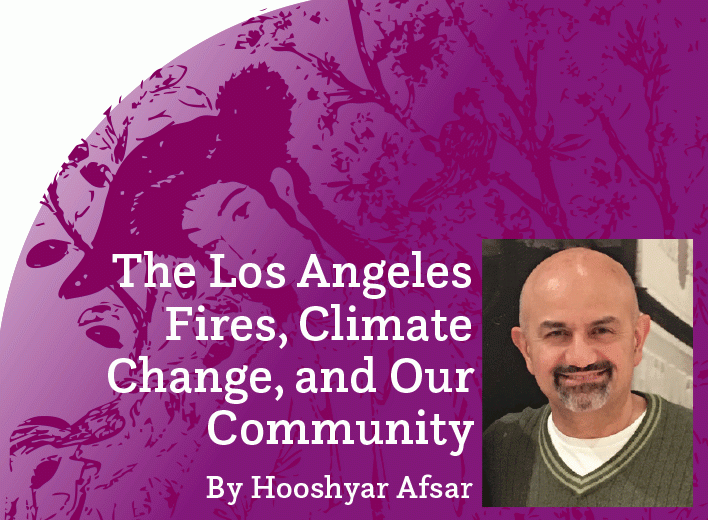By Aria Fani
The much anticipated U.S. presidential election is now behind us, but we are left with massive socio-political debris that requires both short term and long term clean up. A part of the problem is that there is no national consensus over what this mess is. I can only offer my own angle. In the age of extreme political and cultural polarization, seven million more American voters agreed that the presidency of Donald Trump was a grotesque episode of demcoratic norm shattering, naked forms of self-enrichment and corruption, and sociopathic negligence in handling the worst public crisis in modern U.S. history. Well, they may not word it exactly that way but they did come out against Trump. Seven million is not a small number. But thanks to the Electoral College, the arcane and anti-democratic feature of our political system, many pundits are calling this election “close.” In my opinion, any serious clean up would have to begin with Constitutional reform: the Electoral College has got to go. But that is not nearly enough. There is a need to place term limits in Congress and the Supreme Court. We need to address the grossly imbalanced way in which the Senate represents Americans today (California, with 40 million inhabitants, has two senators while 20 out of 50 states, including some Democratic-leaning ones, have an
By Ariaaggregate of 39 million residents with a whopping 40 Senate seats).
Every election is framed by a rhetoric of radical change. Every political campaign makes it seem like the election of their rival would transform the U.S. beyond recognition. But a case for continuity can be convincingly made, especially in foreign policy where both parties pursue global domination. The next four years will demonstrate that creating a rhetoric of change is far easier than changing the structures of power. Regardless of who was going to win this political contest, the following structural problems will remain intact unless there is a legislative will to democratize the U.S. government. Put simply, this is the problem: too much power lies in the hands of too few people. How few? In the case of the tech industry that presides over the biggest surveillance machine ever created in human history, we’re talking about people who live within a single zip code. Any system that produces individuals who are rich enough to write their own laws (Uber/Lyft anyone?) is obscenely iniquitous and undemocratic. No political system can justify legislating on behalf of corporate greed and unaccountability based on economic statistics; instead, it creates a web of myths about “equal opportunity,” “pulling yourself by the bootstraps,” and “free market” to rationalize acts of economic and climate barbarism that otherwise cannot be rationalized.
This election cycle, the Democratic and Republican political machines raised unprecedented sums of money. Democrats outspent Republicans by a very healthy margin and demonstrated the extent to which our broken electoral system is awash with money. Politicians like to say your vote is your voice. As enchanting as that phrase may be, in our current political system, that is just not true. In this country, money has too much say in our electoral and legislative processes. In 2010, the Supreme Court of the United States made sure the dark influence of money would be further cemented in our political system through a misguided and anti-democratic decision referred to as “Citizens United.” Unless our lawmakers use their legislative powers to curtail the influence of money from donors and corporations whose bottomline runs counter to workers’ rights and environmental, climate, and racial justice, our elections will be decided largely by obscene sums of money and our elected officials will continue to legislate and rule on behalf of an ever-shrinking group with a shared zip code.
There are other aspects of our flawed socio-political system that will remain intact under Biden. For as long as the U.S. has an astronomical military budget, its aim, no matter in which partisan rhetoric it may be cloaked, will be the pursuit of global domination. Obama’s presidency taught us this lesson quite well. Not only did he carry on Bush’s War on Terror—which produced more war and more terror—he expanded upon it. The Obama/Biden administration often acted as judge and jury by executing “suspects” around the world, a fact that Obama speaks about without any remorse in his recently-published memoir. Reaching a diplomatic outcome with Iran was a step in the right direction, but that came as a result of crippling sanctions that hurt ordinary Iranians. The Biden administration needs to pursue a more even-handed approach to the Middle East, one that would not turn a blind eye or actively facilitate the human rights violations of countries like Saudi Arabia and Israel. It is not a positive sign that the Biden team has already announced that it won’t be conditioning the U.S. monetary aid to Israel.

We have witnessed so many marches in the past four years: the Women’s March, the March for Our Lives, and the protests against the Muslim ban. But none has been more sustained, expansive, and era-defining than the marches for Black Lives Matter. Many have argued that this was the first time that BLM received wide-ranging acceptance for its efforts to achieve racial justice in the U.S. What often goes unnoticed is the fact that what BLM fights for would also be the best outcome for the safety and mental well-being of police officers. Is it healthy to have a police force so excessively militarized? Is it acceptable to have this amount of economic disparity in the world’s richest country? And when you combine structural racism, poverty, and lack of educational resources with over-policing and a for-profit prison system, you will get a deadly cocktail. This past election, cities like Los Angeles and Seattle voted to invest more in community building, instead of community policing. I am confident that ten years from now, you will see the positive results of investing in humans, rather than investing in tear gas canisters and riot gear designed to impose “law and order” on a world ravaged by the sheer lawlessness of racial capitalism. Nation-wide changes appear unlikely to happen on a federal level.
Sadly, immigration is yet another area where I expect more continuity between the Trump and Biden administrations. Of course, Biden will be far less cruel and racist than Trump, but that is a very low bar. One needs to realize that cruelty and racism are baked into our immigration laws. Our immigration system, especially with respect to Latin America, has historically worked to preserve the economic interests of corporate America. The latter has needed cheap labor to produce inexpensive goods. Having an undocummented labor force that can be threatened with deportation any time it demands living wages or humane treatment clearly suits corporate America, and the U.S. government has been more than happy to oblige with its illiberal visa policy. Because corporate capitalism feeds off a for-profit educational system, a for-profit medicine and health care system, and a for-profit prison system, our immigration laws and practices treat immigrants as criminals. And no book does more justice to the defining story of our time, the on-going assault on asylum, than John Washington’s The Dispossessed: A Story of Asylum at the US-Mexican Border and Beyond (Verso, 2020).
John Washington is an investigative journalist who primarily writes about immigration and criminal justice. He has also translated into English the work of such Latin American authors as Óscar Martinez, Anabel Hernández, and Sandra Rodriguez Nieto. The Dispossessed revolves around the story of one Salvadoran young man, Arnovis, and his plight to seek protection in the United States from maras or street gangs that threaten his life back in El Salvador. The book follows Arnovis and his daughter from the moment when his life is plunged into danger and uncertainty to their many efforts to seek asylum in the U.S. Arnovis serves as an anchor for a book that covers so much more than one family’s plight. Starting from its brilliant title, Washington frames this as a global story of dispossession. Asylum was created in the early 1950s to provide safe haven to European refugees in the wake of the horrors of World War II. Asylum is a transnational mechanism designed to provide relief and protection for people trapped within their nation-state. But it is not only the nation-state that has dispossessed people like Arnovis— the ultimate dispossession happens at the hands of racial capitalism, the driving force of nation-states, whose genesis was marked by the theft of natural resources and human life.
You may be forgiven to presume, based on its subject matter, that this book would be dull and tedious. Far from it! The Dispossessed is actually written with flair and clarity. Washington’s prose becomes deeply lyrical in places where he conveys the twisted and oppressive nature of our immigration laws or the depths of despair and hope that asylum seekers feel throughout their journey. See this passage for instance, on page 50: “When a judge denies a person asylum, they are redispossessing them not only of their story, but of what connects them to their home, the place where being human flourishes.” Or consider this passage on page 224: “The United States has built in, into its deepest foundation, the contradiction of claiming to be the land of the free— of ‘safe and agreeable Asylum’— and of engaging in the racist persecution of those clambering for freedom. It is a land of selective welcome and outright refusal.” It is hard not to be constantly moved by Washington’s storytelling and words.
Throughout the book, you will meet different people who are part of this broken human ecology: judges who hold a person’s life in the palm of their hands, ICE agents who terrorize undocummented communities, and some who even rejoice in tearing families apart, brave religious activists who open the door of their churches to asylum seekers who have been wrongfully denied asylum, and fathers who refuse to give up on a safe and dignified future for the children. You will learn about how our immigraton laws have historically been written by a small class of male, white, and affluent lawmakers whose racist laws have disproportionately affected more dark-skinned immigrants and asylum seekers like Haitians. You will learn that coyotes, or human traffickers, and organized crime did not form in a vacuum. Their presence affirms years of misguided policies, financial and political support for genocidal regimes in Central America, and undemocratic military interventions in that region. John Washington is an ideal story-teller. He has spent years traveling in Latin America, has explored the Arizona borderland, and studied and covered our immigration policies for The Nation and, more recently, for The Intercept. If there is one book that will show us the human cost of not paying close attention to national politics after Trump, it is John Washington’s The Dispossessed. Please support the publication of such compassionate and vital investigation like this; buy your copy at bookshop.org.
There is no reason for despair. All the structural problems outlined in this essay have a legislative solution. Politicians, both Democrats and Republicans, like to sell us this false idea that the U.S. government is extremely limited in its ability to transform the lives of Americans. They’ve been selling us the idea that the U.S. government needs to cede more space to the private sector and seek its partnership in addressing the most pressing issues of our era. Let’s not fall for it! The private sector, as awesome and innovative as it can be, has a different bottom line (capital gain) than the government (public service). The U.S. government has the power to intervene impactfully and meaningfully in the lives of its constituents. That is why, after years of corporate-globalist policies, millions of people resonated with Trump’s idea of a government making crucial interventions in their lives. It is too bad that Trump displayed zero interest in public services, but that does not mean that we should let the Biden administration take us back to a mythical normalcy. No such thing exists.
The U.S. government has the power to address structural problems. It has the power, for instance, to challenge the cartoonish amount of monopoly created by corporations before it is too late. It has the power to make corporations like Amazon and Netflix pay taxes. It has the power to condition corporate bailouts on living wages for workers. It has the power to create new exciting jobs to help our work force move toward sustainable energy. I am an educator; my craft is words. My power is to use language instructively, effectively, and honestly to make you reflect, make you inspired and angry, and ultimately, persuade you to think differently. But our lawmakers don’t just have words or “thoughts and prayers” to offer us. They have one of the most powerful mechanisms available to any of us in a democratic society: the power to make and enforce laws. Don’t buy it when they tell us they don’t have the power to change things and then ask us to make a donation to their next campaign and show up to vote. Voting is over in America. It’s time to legislate.

You may reach Aria via ariafani@uw.edu

















